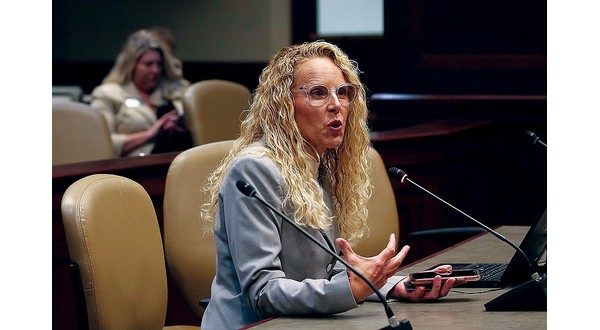
Rep. DeAnn Vaught, R-Horatio, discusses a report of a study on mental and behavioral health Nov. 14 during the joint meeting of the Health Services subcommittee at the state Capitol in Little Rock. (Photo courtesy of Arkansas Democrat-Gazette)
Advocates, lawmakers and state bureaucrats hope regulatory changes that will increase Medicaid reimbursement rates for mental health services and cut red tape for clinicians will help calm a growing mental health crisis in Arkansas.
For 18 months a task force of mental health clinicians, legislators and Department of Human Services officials has worked on a report on how to modestly reform mental and behavioral health care in the state. The Arkansas Legislative Council on Dec. 16 approved the report, which has been a guide for DHS’ rule changes and will serve as a road map for lawmakers in the next sessions. The state will increase Medicaid reimbursement rates to encourage more providers to take on patients with Medicaid.
“My hope is that this will make a great stride in the right direction. That’s my hope,” said state Rep. DeAnn Vaught, who sponsored legislation creating the task force. “Do I think it’s going to fix everything? No, because I think mental health is ever moving.”
Depression and suicide rates for teens are up while jails and prisons are full of adults suffering from a wide range of issues from increased drug addiction to untreated psychiatric problems, said Vaught, a Republican from Horatio.
Those suffering from behavioral health issues are also in need of care, with a dwindling number of people in the field able to provide it. Officials from the Department of Human Services proposed changes in state regulations that allow for workers in similar fields to more easily fill labor shortages in behavioral health. Since much of the emphasis is on at-home care, the department will shift the regulations to allow non-professionals in similar health care fields, overseen by clinicians, to provide care.
Gavin Lesnick, a spokesperson for the Department of Human Services, said the agency also has finalized a slate of rule changes that would cut regulations for mental health care providers, known as manuals. The state’s Medicaid manuals are a set of regulations on how the state pays for services and what rules providers must follow.
Some mental health providers have said the current slate of regulations is cumbersome, making it difficult to bill patients who are on the state’s Medicaid plan.
“The manuals that DHS was going by were ancient,” Vaught said.
The Independent Licensed Practitioner Certification manual, which is only required for health care providers who accept Medicaid, has 17 pages of rules that require clinicians to be on 24/7 call with a 15-minute response time, identifying any law enforcement or medical facilities within a 50-mile radius and passing an annual fire safety inspection.
Those regulations, which will be repealed as of Jan. 1, apply only to mental health providers who treat clients on Arkansas Medicaid, leading some to only accept private insurance to avoid the red tape.
“There’s hundreds and hundreds of private practices in the state and I would say the majority of them elect to not hassle with Medicaid because they put themselves at liability for not following the rules because there are too many rules,” said Thomas Ritchie, a licensed professional counselor with practices in White and Lonoke counties.
For mental health professionals, much of the challenge is finding a way to provide more care with fewer clinicians. Since the covid-19 pandemic and ensuing isolation, cases of mental illnesses have skyrocketed across the nation, particularly with cases of depression and suicide.
Many mental health professionals said they have months-long waiting lists for outpatient treatment that have overwhelmed their practices and have led to burnout.
“The burnout rate with therapists in the mental health world is high because we are chronically inundated with stories of trauma,” said Shawna Burns, a licensed mental health counselor in Harrison.
Burns said the state Medicaid regulations requiring independent clinics to be on 24/7 call for emergencies with 15-minute response times over the phone and two-hour response times for face-to-face calls was tough for smaller providers like herself.
“They reduced the amount of regulation and barriers that it takes for providers to actually access Medicaid beneficiaries, and that’s a really big deal that also is not being talked about very much because it really only applies to independent providers,” Ritchie said. “They removed a huge hurdle in the way of the amount of intricate detail that we have to get into to even have an office that can treat Medicaid beneficiaries.”
The Department of Human Services said it will increase Medicaid reimbursement rates for many mental health services including psychotherapy, which for many, but not all services, pay 80% of what Medicare pays. The new rates won’t match the rates of private insurance, but are aimed at encouraging more providers to accept patients who are covered through the state’s Medicaid plan.
“Just increasing the rate alone was massive,” Burns said. “We need more providers to bill Arkansas Medicaid.”
The task force also recommended legislation in its report, which could be used as a guide for lawmakers in the next session. The report specifically calls for lawmakers to draft legislation to increase the number of psychological examiners, reimburse screenings for early childhood autism and maternal depression, require depression and anxiety screening to be covered by insurance and examine the safe storage of firearms and drugs chemicals.
The task force also emphasized the need for more mental health screenings in schools, as depression and suicide rates have increased.
Vaught said it is unlikely that the General Assembly will pass all the recommendations in the next session, but the task force will meet again after the session ends.
“You can’t eat the entire elephant in one session,” Vaught said. “It’s going to take several sessions for us to truly work at these problems.”
WebReadyTM Powered by WireReady® NSI










